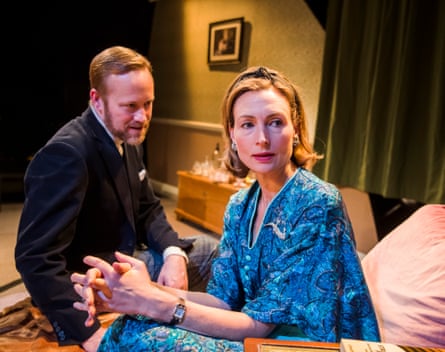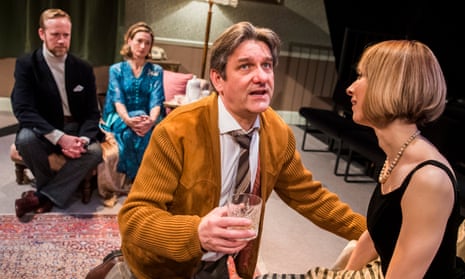Dedicated to retrieving forgotten plays, Two’s Company bring us a rare sighting of James Saunders’ Bodies, first seen at the Orange Tree, Richmond in 1977, and later revived in the West End. While the play is about the spiritual crises of the time, it stands up well because it addresses serious questions about the creative value of suffering and makes you feel something vital is at stake.
The play starts as a study of two middle-class couples who each have affairs with the others’ partners. In that way it anticipates Harold Pinter’s Betrayal (1978), Peter Nichols’s Passion Play (1981) and Tom Stoppard’s The Real Thing (1982) in using adultery as a metaphor for wider anxieties. But Saunders gets to the heart of the matter in the second half, when the couples meet again after a nine-year-gap. Mervyn, an ebullient headmaster, has engineered the reunion to the dismay of his wife, Anne, so that he can question the newfound serenity of the guests, David and Helen, who have rebuilt their lives with the aid of a then fashionable therapy, EST (Erhard Seminars Training).

It would be an even better play if Saunders allowed the mercilessly articulate Mervyn to be rigorously challenged and if the two women played a more pivotal role.
But Saunders still raises big issues and, while apparently endorsing Mervyn’s argument that art is “the most refined expression of neurosis”, also shows that it is possible to wallow in romantic agony. The play leaves you debating whether it is better to be happy and well adjusted, as David and Helen seemingly are, or racked with memories of the past like the intense Mervyn and Anne.
Tricia Thorns’s production moves smoothly from domestic comedy to intellectual debate and Tim Welton perfectly catches the dual aspects of Mervyn: he is both a passionate champion of the inseparability of poetry and pain and a bit of a boozy charlatan.
There is impeccable support from Annabel Mullion as his caustic wife, from Peter Prentice as the self-assured David and from Alix Dunmore, who subtly suggests that Helen is all too aware of the sense of loss that comes from curative therapy.

Comments (…)
Sign in or create your Guardian account to join the discussion